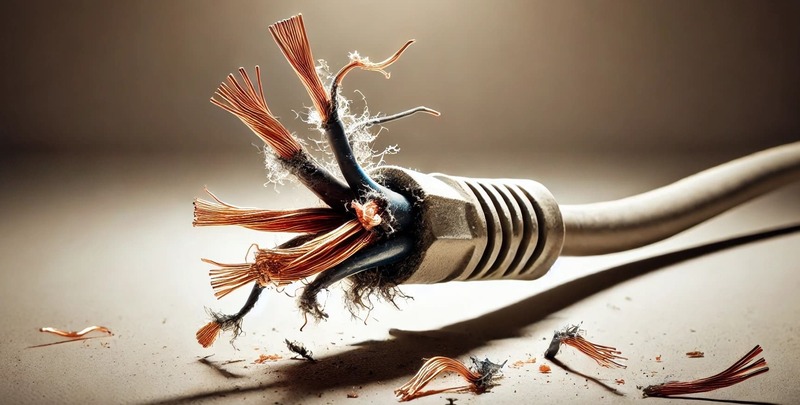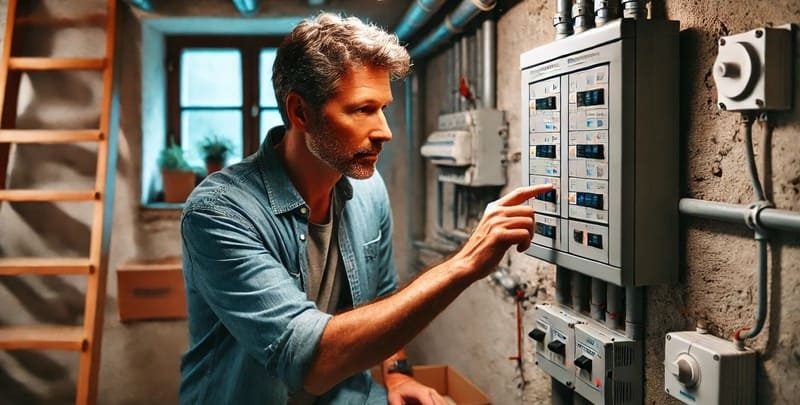Exposed wires in your home are more than just a visual nuisance—they can be a major safety threat. Whether due to aging systems, DIY mishaps, or general wear and tear, these hazards can lead to serious consequences if not addressed. From electrical shocks to fire risks, leaving wires exposed puts your family and property at risk. Many people don’t realize how quickly a small issue can turn into a big problem, often leading to expensive repairs or even life-threatening situations. It’s important to take action as soon as you spot any exposed wiring. Ignoring it could lead to accidents, legal issues, or violations of local building codes. In this article, we’ll go over the real dangers of exposed wires, why they’re so dangerous, and what you can do to keep your home safe from hidden electrical threats. Exposing wires in your home is one of the most common causes of electrical shocks and burns. These incidents can happen to anyone, especially children and pets who may not understand the danger. Here are some key risks: Fixing exposed wires right away is essential to prevent serious harm and ensure everyone in your home stays safe. One of the most serious risks of exposed wires is the potential for electrical fires. Damaged or frayed wires can lose their insulation, exposing live wires that can spark when they touch other materials like wood, drywall, or other cables. These sparks can ignite nearby flammable materials, leading to fires that spread quickly and are hard to control. According to fire statistics, faulty wiring is one of the top causes of house fires. Wires hidden behind walls or under floors are especially dangerous because they can go unnoticed until it's too late. Regular inspections, especially in older homes, are crucial for identifying and fixing these issues before they become a real threat. Always call a licensed electrician to handle any exposed wiring and reduce the risk of fire in your home. Exposed wires can also cause short circuits, which can damage your electrical devices and increase your energy bills. Here’s how: To avoid these problems, it’s best to fix exposed wires as soon as possible. Routine electrical checks can also help prevent future issues and keep your home running smoothly and safely. Exposed wires in areas where water is present—like bathrooms, kitchens, or outdoors—are particularly dangerous. Water conducts electricity very well, so even a small amount near an exposed wire can lead to a serious shock. A dripping tap, splashed water, or even a wet floor near a live wire can create a deadly situation. In places like kitchens and bathrooms, where outlets and appliances are close to water sources, the risk is even greater. Outdoors, during rain or when using sprinklers, the risk increases significantly. If someone touches the wire or the water it has touched, the results can be life-threatening. That’s why it’s so important to fix exposed wires in these areas immediately. Installing Ground Fault Circuit Interrupters (GFCIs) can offer extra protection, but the first step should always be to repair the wiring itself. Exposed wires aren’t just a safety issue—they can also lead to legal problems. Electrical codes are designed to protect both people and property, and failing to meet them can result in fines or penalties. As a homeowner, you’re responsible for maintaining safe electrical systems. Ignoring exposed wires can put you in violation of local building codes, especially if the issue leads to a fire or injury. This is especially important if you're planning to sell your home. Inspectors or buyers will notice exposed wiring, which could delay the sale or lower your home’s value. In rental properties, landlords are legally required to provide a safe environment, and exposed wiring can lead to disputes or lawsuits. To avoid these issues, it’s best to address any exposed wiring as soon as possible and hire a licensed electrician for the job. Staying on top of electrical safety helps protect your home and keeps you in compliance with the law. If you find exposed wires in your home, it’s important to handle the situation carefully to avoid accidents. Here’s what you should do: Taking these steps can help prevent electrical shocks, fires, and other dangerous situations in your home. Exposed wires are a serious hazard that shouldn’t be ignored. Whether they lead to shocks, fires, or damage to your appliances, the risks are too great to overlook. Regularly checking your home’s electrical system and addressing any exposed wiring can save you from costly repairs, legal trouble, or worse—danger to your loved ones. If you ever come across exposed wires, always prioritize safety by turning off the power and calling a licensed electrician. Don’t try to fix it yourself unless you’re trained and equipped to do so. By being proactive and attentive, you can keep your home safe and prevent accidents before they happen. When it comes to electricity, safety should always be your top concern. Please note: This information is for general guidance only. Regulations vary by location, so please consult your local authorities or a licensed professional before proceeding with any work. See our Terms & Conditions for more details. Vae Emulsion Cw40-960,Sinopec Vae Cw40-905,Sinopec Eva Emulsion,Sinopec Vinyl Acetate Ethylene Emulsion Cw40-960 Saint Petrochemicals Limited , https://www.saintpec.comThe Hidden Dangers of Exposed Wires
Electrical Shocks and Burns

Fire Hazards
Short Circuits and Equipment Damage
Increased Risk of Electrocution in Wet Areas
Legal and Regulatory Issues

How to Handle Exposed Wires Safely
Stay Safe – Protect Your Family and Home